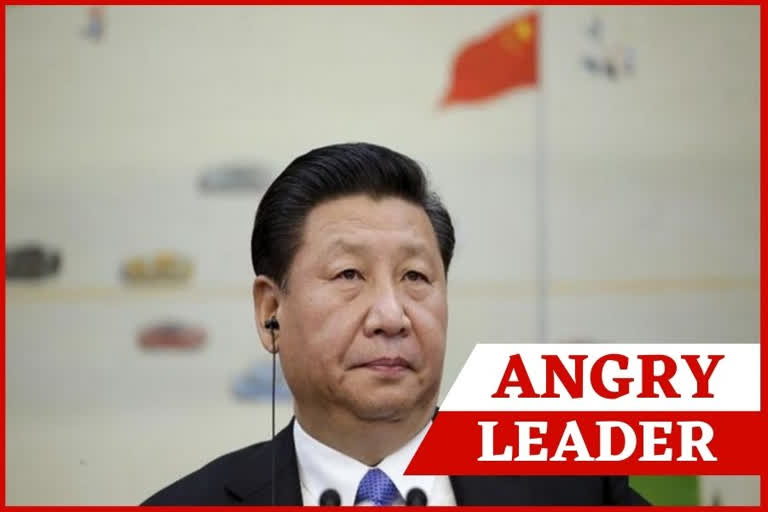Hong Kong: Predictably, China has reacted angrily to successful Indian military action along the Line of Actual Control (LAC), with the People’s Liberation Army (PLA) caught napping when Indian troops moved to occupy hilltop features near Lake Spanguur on the night of August 29-30. This anger allegedly ascends to the top of China’s military hierarchy, Chairman Xi Jinping.
China has for a long time relied on India behaving reactively rather than preemptively, as it manufactured seizures of territory along the troublesome un-demarcated border. This time the PLA has been on the receiving end, and Chinese Communist Party (CCP) leadership is not happy.
Some media alleged that the CCP leadership was “enraged” that a PLA commander withdrew forces to avoid physical conflict at Spanguur, though evidence to substantiate this is yet to emerge.
This latest embarrassment came on top of the bloody fracas in the Galwan Valley on 15 June, which occurred on none other than the auspicious occasion of Xi’s 67th birthday. Losing casualties, with Chinese numbers still a state secret, represented a severe loss of face to Xi on his birthday.
Dissatisfied with their level of CCP and personal loyalty, it is also rumoured Xi is on the brink of a 'brutal purge' of the PLA and regular law enforcement agencies. China’s authoritarian leader has always sought to consolidate military power, something his immediate predecessors could not achieve, and he is becoming even more paranoid about political loyalty and social unrest within China.
This explains why, on August 26, the Chinese police apparatus (including the Ministries of Public Security and State Security) swore fealty to the CCP and was removed from the State Council’s chain of command.
A ceremony saw Xi pompously conferring a new flag on the police, one bearing the red colour of the party. Xi “ordered the police to be loyal to the party, serve the people and be impartial in law enforcement and strict in discipline”.
Law enforcement forces have now followed suit as the People’s Armed Police (PAP), which Xi placed under his immediate leadership in the Central Military Commission (CMC) in January 2018. In any popular uprising such as the one that happened in Tiananmen Square in 1989, the PAP would be called upon to put down any unrest.
Read more:Xi adopting ultra-nationalist agenda to strengthen grip on China
Xi has repeatedly called for personal loyalty and issued warnings about “two-faced” people, a phrase referring to someone who pledges obedience but secretly resists. Xi wants to get rid of all such people from positions of influence.
Furthermore, a political study campaign is being prosecuted across political and legal forces to promote a “spirit of rectification”, which harks back to Mao’s destructive purges. Three deputy minister-level public security officials have already been detained in 2020, and Xi’s paranoia seems to be rising to hysterical levels.
Xi has always been a hands-on leader, probably because he is distrustful of anyone outside his handpicked inner circle. It is believed he encouraged the launch of four ballistic missiles into the South China Sea on August 26, another provocative action sent as a warning to the USA.
A dramatic purge of the law enforcement system seems set to occur and, with Xi disappointed about how land grabs along the Himalaya border are going, further refinement of the PLA could occur.
Of course, every time he implements such a purge, the PLA becomes a more politically astute organization and less military-focused as leaders seek to consolidate their positions and think less of the overall benefit of the PLA.
With ongoing border tensions, the mood on Chinese social media platforms like Sina Weibo reflects concern, anger and deprecation of India as well. For example, one netizen quoted Chinese professor Zhang Weiwei as saying: “India’s expert advice is for Modi not to provoke China. Otherwise, India will receive five times the humiliation it had in 1962.”
An unusually muted post by Hu Xijing, editor-in-chief of the Global Times, received nearly 20,000 likes: “Both India and China are great powers and capable of mobilizing their national strength to solve a military border conflict. Yet, at this very moment, both sides have to calm down.”
Another poster put the tensions with India in perspective: “The Sino-Indian border conflict is a matter of time. In the coming winter, both sides have to withdraw their troops. Hence, whether China can get back to Taiwan is the utmost important problem for China!”
However, hubris remains a common sentiment. One Chinese netizen, who is infamous for his bullheadedness, posted to popular acclaim, “Two months ago, India just suffered what it deserved. The Indian leader army officers ran away and abandoned their colleagues when the PLA struck them hard, leading to the death of 20 Indian soldiers and officers. How dare they come back now?”
There was pride in the PLA too among many citizens. “The Sino-India border is having conflicts once again. Soldiers of the PLA have left their suicide notes and loaded bullets into their [rifle] chambers.” This harked back to an earlier post doing the rounds online, supposedly written by a PLA soldier to his wife, “If I can’t come back, I will give you a pension; if I’m disabled, I’ll give you a divorce certificate; if I come back, give yourself to me.”
Also read:China targets US media over visa restrictions
Interestingly, however, Weibo began censoring the hashtag #China-India border conflict to tamp down the issue. When this topic is searched, a message appears saying, “According to the relevant laws, regulations and policies, the page is not found.”
